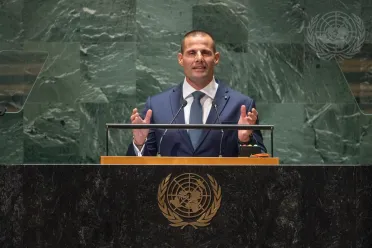Statement
Statement summary
ROBERT ABELA, Prime Minister of Malta, spotlighting that his country is a “proud island nation”, quoted English poet John Donne, who said “No man is an island entire of itself. Every man is a piece of the continent, a part of the main.” Conscious of its unique geographic positions at the crossroads of Europe and Africa, Malta stepped up in a unique role, building bridges and understanding between different traditions, he observed, adding: “Earlier this month we were proud to be just such a bridge.” Trusted by both sides, the country hosted talks between the United States Security Adviser and China’s Foreign Minister. The countries response to the situation in Ukraine and other global crises is guided by its values of neutrality, he noted, stressing that Malta will never be neutral when it sees pain caused by an illegal invasion. As the country tackles many challenges it faces with its Mediterranean neighbours, it will host the Summit of Southern European Union countries in September, he announced.
“The most pressing issue in the Mediterranean is Libya,” he underscored, recalling that within hours of the disaster caused by Storm Daniel, Malta — being a good neighbour — was on the way to provide rescue. Reiterating his country’s objective to be a “bridge between the continents”, he said the Government opened new diplomatic missions in Ghana and Ethiopia; launched its first Strategy for Africa; and concluded agreements with Ethiopia to facilitate business connectivity. While the sea plays a profound part in Malta’s national life and has a special place in the hearts of its people, he emphasized that securing the future of the seas and oceans is his Government’s urgent imperative. “We must preserve the sovereignty of coastal States — no matter what the ravages of the sea,” he underscored, pointing to the country’s “Island for Islands” initiative and its scholarship programme for students from small island developing States.
He went on to say that — like many young nations — Malta has harnessed digital technology and is breaking down trade and tariff barriers to expand into sectors previously off-limits to small nations. To equip more citizens — of all ages and from all backgrounds — with digitals skills, it has included information and communications technology (ICT) as a compulsory subject in secondary schools. Recognizing that, it may seem, that “technology is in charge” and the society has lost control, he said that artificial intelligence has a huge impact on all aspects of society. “But if we, as leaders, take [the] right decisions — the impact can be a positive one,” he stressed, emphasizing that this technology can enhance public services. To this end, Malta has developed six pilot projects, covering areas from health care to traffic management — “taking ownership, not trying to ignore the future”.
“To make artificial intelligence a global good, we need global action,” he continued, calling for enhanced international cooperation in the field. Also noting that technology is changing fast, while its potential is vast, he said that failing to work together is not an option. “Working together is not only a key value for Malta,” he observed, also noting that it is at the centre of the country’s political tradition. “Standing together we can achieve so much more than working alone,” he emphasized.
To make multilateralism work in this age of insecurity we need to ensure that a much wider group of voices are heard – in this United Nations, and around the globe, the Prime Minister of Malta said on Friday.
Full statement
Read the full statement, in PDF format.
Photo

Previous sessions
Access the statements from previous sessions.
